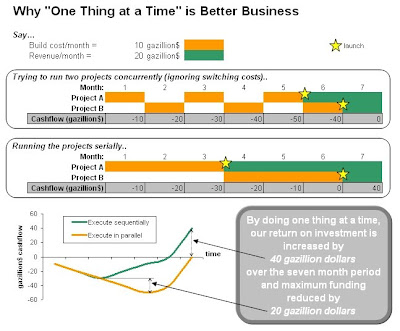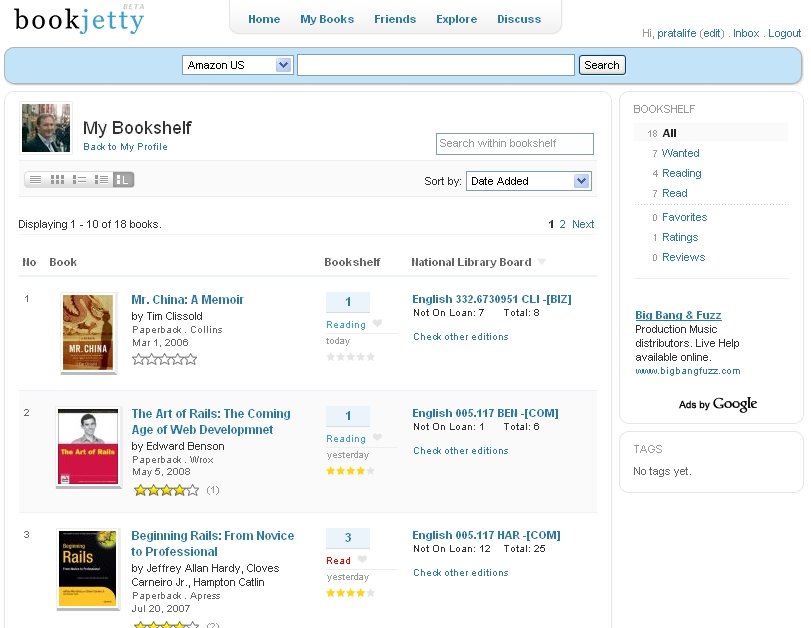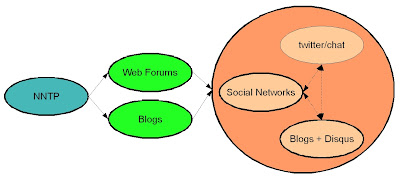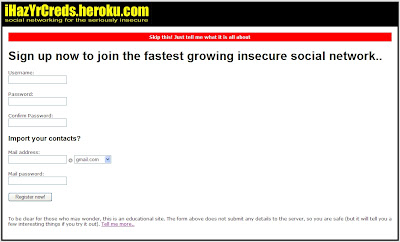Doing one thing at a time
James Shore discussed Agile Release Planning on this recent PM podcast, and it was refreshing to hear the benefits of agile pitched to a product management audience.
Like the best ideas, the tenets of agile appear almost too simple to be true. "Master of the bleeding obvious" Basil Fawlty would say. Yet most organisations seem structurally incapable of behaving along these lines.
James' presentation is very entertaining, and well worth a listen. He keeps the agenda short and well tuned to a PM audience. Although the ideas are born from a software environment, they are largely transferable to other domains. A discussion of five concepts to help you increase the value you deliver in business:
- Work on one project at a time .. it improves your ROI
- Release early and often .. get to market faster with a minimum, but valuable feature-set. Not only do you get to take advantage of the real customer voice sooner, but, again, better ROI.
- Adapt your plans .. to slavishly avoid change is to confound the opportunity to increase the value of your work as new things are learned along the way
- Conduct experiments .. your project can have many outcomes, and you will never know which is best unless you test options, collect data, and analyse
- Plan at the last responsible moment .. avoid costly planning that is basically trying to predict the future (unsuccessfully). The later the decision, the more information you will have available to make a good decision.
Here's my version of the graphic to illustrate the point:

read more and comment..
bookjetty - a great new site to track, share, buy and borrow books
 I've fallen in love with bookjetty, a great new site for books by Herryanto Siatono.
I've fallen in love with bookjetty, a great new site for books by Herryanto Siatono.
Although this blog is officially dedicated to prata (and always will be!), you can tell I use it to keep a diary of the books I'm reading. I probably always will, but I do try out all the "book tracking" sites, facebook apps and so on that I come across.
None have really jiggled my worm until I discovered bookjetty.
The killer feature for me is the great library integration on the site. It helps answer all the usual questions I have whenever I hear about a new book..
- Have I already got it or read it before?
- Does one of my friends have it? Maybe I can borrow it..
- Can I get it from the local library?
- Can I buy it online?
- (oh, and if the last two steps fail, I may actually visit a real bookstore!)
The bookjetty developer(s?) have done a great job of integrating the libraries, especially considering that most are still running archaic web 0.1 systems which are not very mashup friendly. I've posted before about a kludge to do library lookups from an amazon page, but it never works very reliably because of the dumb library catalogue it needs to talk to, so I can appreciate some of the challenges they may have had.
And here's an example of how the library checks appear...

If you are into books, I heartily recommend you go and register at bookjetty and check it out!
read more and comment..
Moving to Disqus for Comments
I recently moved this site's commenting feature to disqus.com after listening to the great interview with Daniel from Disqus on net@night#53. I see I'm not alone..
You may think A Blog Without Comments Is Not a Blog, and most people have reviewed Disqus in terms of the improved commenting features it provides.
There is another point of view that really hit home for me as I considered the move.
I remember the pre/early web days when I was a very heavy nntp (news) user. In the job I had at the time, it became my lifeline to various specialist groups where I would share the little I knew and was able to draw on the sometimes instantaneous feedback from a global community of peers. I think those days still rank as the best and most productive community networking experience I have ever had.
As the early web came to life there were many areas in which we took short-term hits for (hopefully) long term gain. We moved from (pre-Domino) Lotus Notes to web publishing for example, not because it was better but because it represented a broadly accessible, stanadards-based platform. Web 2.0 is I think only now starting to surpass the degree of interactivity you could achieve with Notes circa 98.
IMHO, collaboration is another area that's been through a similar process. Simplifying somewhat, I saw blogs and web-based forums as a bifurcation of the old collaboration experience I had with nntp. Blogs at least did a decent job of allowing anyone to publish what they thought was worth sharing. Web-based forums never really tickled my mustard however.
Implementations have never been quite as efficient for greasing collaboration as nntp, and they lack the universal federation model that nntp has always had baked in. It also meant that forum discussions and information publishing (via blogs etc) became divorced.

So when I look at Disqus (and other similar offerings), I see a scheme to finally re-unify the publishing and discussion worlds. Disqus provides the forum capability integrastes with tyhe blog publishing world, eliminating the question "should I blog it, post it to a forum, or both?"
As you can tell from my little diagram above, I don't see much role for web forums as we know them today in the new world of collaboration. Maybe I am overly negative, but it does make me smile/cringe whenever I hear someone talking about "web 2.0: you know, forums etc..."
Notes on integrating Disqus with blogger
I'm using blogger. Since there are various guides around for the manual integration of Disqus, I thought it would be worthwhile to report on how the process went for me.
I'm using customised blogger layouts for my blogs, and actually found that the automatic integration support built into the setup process on Disqus worked very well.
Just a few things to note:
- I used the "upload template" feature to load the version modified for me by Disqus. I think because of this, I had to "expand widget templates" and save the template again after the upload to have it take effect.
- There is no import of existing comments yet (future feature), but it is possible to go back to old posts that do not yet have comments and switch them to Disqus mode by selecting the "Don't allow" reader comments post option.
read more and comment..
Some more on secure social networking - iHazYrCreds
The other day I added my voice to the call to end the perfidious practice of social networking sites requesting your email password.
In the discussion I made an off-hand reference to a fictitious site called iHazYrCreds. Well, it's not fictitious any longer ;-) For better or worse, you can now visit iHazYrCreds.tardate.com to find out more about the common password traps to avoid.
I'd like to see the day when asking for an email password in order to "import contacts" is deemed totally unacceptable (and negligent professional practice).
I would also welcome any moves by the big email providers (google, yahoo etc) to explicitly outlaw such use in their terms of service. I'm no lawyer, but I believe it is debatable whether it is already a violation. 
read more and comment..